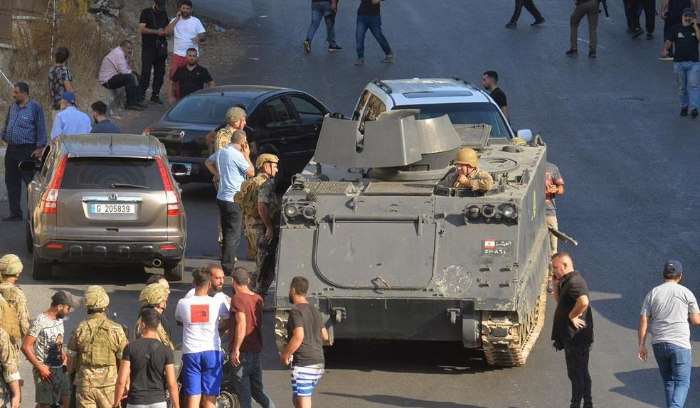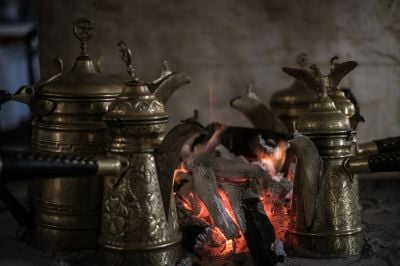
The Lebanese Army deployed in Khaldeh to open the roads on Nov. 16, 2021. (Credit: NNA)
BEIRUT — Wednesday's ruling by the Lebanese military court in the case of the August 2021 clashes in Khaldeh, south of Beirut, has caused a stir over the past two days, both on the ground and at the political level, with several parties denouncing a sentence that they say favors Hezbollah at the expense of members of the Arab tribes in the region.
The Arab tribes are descendants of Sunni Bedouin tribes that settled on the coast south of Beirut decades ago.
In August 2021, violent clashes that included the use of automatic weapons and rocket-propelled grenades took place for several hours between Hezbollah supporters and members of the Arab tribes of Khaldeh, leaving two people dead.
The fighting ignited when the funeral procession of Ali Chebli — a member of Hezbollah — was ambushed.
Chebli had been shot dead a few days earlier at a wedding by the brother of a young Ghosn family member who had been killed in a brawl a year earlier in Khaldeh.
The judgment handed down by the president of the military court, Gen. Khalil Jaber, sentenced several dozen people, all members of the Arab tribes of Khaldeh, according to the state-run National News Agency.
Nine of those found guilty, who were tried in abstentia, received the death sentence.
Although the death penalty exists in Lebanese law, a moratorium on executions has been in place since 2004.
Another man was sentenced to 10 years of hard labor, and five were sentenced to nine years of hard labor.
Omar Ghosn, a Salafist sheikh considered a leader hostile to Hezbollah in the Khaldeh region, was sentenced to seven years of hard labor.
Two others were sentenced to five years of hard labor, and six were sentenced to one and a half years in prison. The latter were released, considered to have already served their sentences while awaiting the military court's judgment. A minor was referred to the competent court. In addition, 11 people were cleared by the court of wrongdoing.
As soon as the ruling was handed down, Arab tribesmen protested what they said was an injustice to them.
The highway between Khaldeh and Beirut has been blocked by demonstrators several times since Wednesday, including with burning tires, according to the Traffic Management Center (TMC).
'Cruel' judgment
And at the political level as well, voices were raised against the ruling, especially within the parties opposed to Hezbollah.
MP Ghayath Yazbeck (Lebanese Forces/Batroun) said on Thursday, according to comments reported by the NNA, that the sentences handed down "prove once again that the military court is under the control of Hezbollah and that it issues judgments in its name and not in the name of the people."
He highlighted that the LF had submitted a bill to Parliament that, if approved, would limit the court for the trial of the military, calling for its rapid adoption.
Samir Geagea's party had strongly criticized the body for its follow-up to the clashes in Tayyouneh in October 2021 between members of the Amal Movement and Hezbollah on the one hand and gunmen posted in the neighborhood of Ain al-Rummaneh, known for its allegiance to the LF, on the other.
For his part, Ashraf Rifi, a Tripoli MP known for his hostility to the Shiite party, condemned on Wednesday "the partiality and politicization of the military court," which he said is a "tool in the hands of Hezbollah that it uses to take revenge on its rivals through contradiction, injustice and revenge, which we reject and we will challenge by all means."
MP Bilal Houshaymi (Zahle/related to the Future Movement) denounced "cruel judgments against the youth of the Arab tribes of Khaldeh" and the bias of the sentences imposed. "How was the over-armed party that carried out the aggression exempted from prosecution despite the evidence of its involvement in clashes?" he said, calling on Dar al-Fatwa, the highest Sunni authority in Lebanon, and MPs from this denomination to react.
In a long statement, Forces of Change MP Mark Daou, representing the constituency of Mount Lebanon IV (to which Khaldeh is attached), criticized an "unjust" judgment that aims only to "satisfy Hezbollah."
The Progressive Socialist Party (PSP), led by Walid Joumblatt, reacted to the court decision in a statement on Thursday, emphasizing the importance of reconciliation, and calling for the military court to limit itself to judging cases concerning army personnel.
The PSP and its leader had tried to mediate, along with other parties and the army, between the Arab tribes and Hezbollah.
